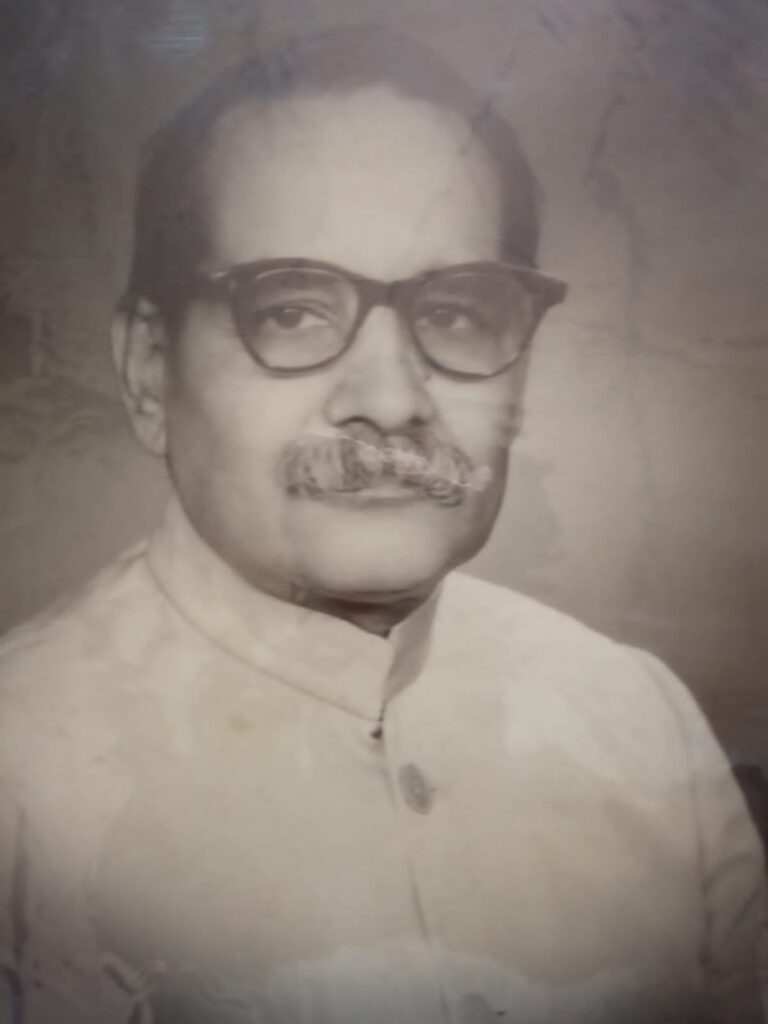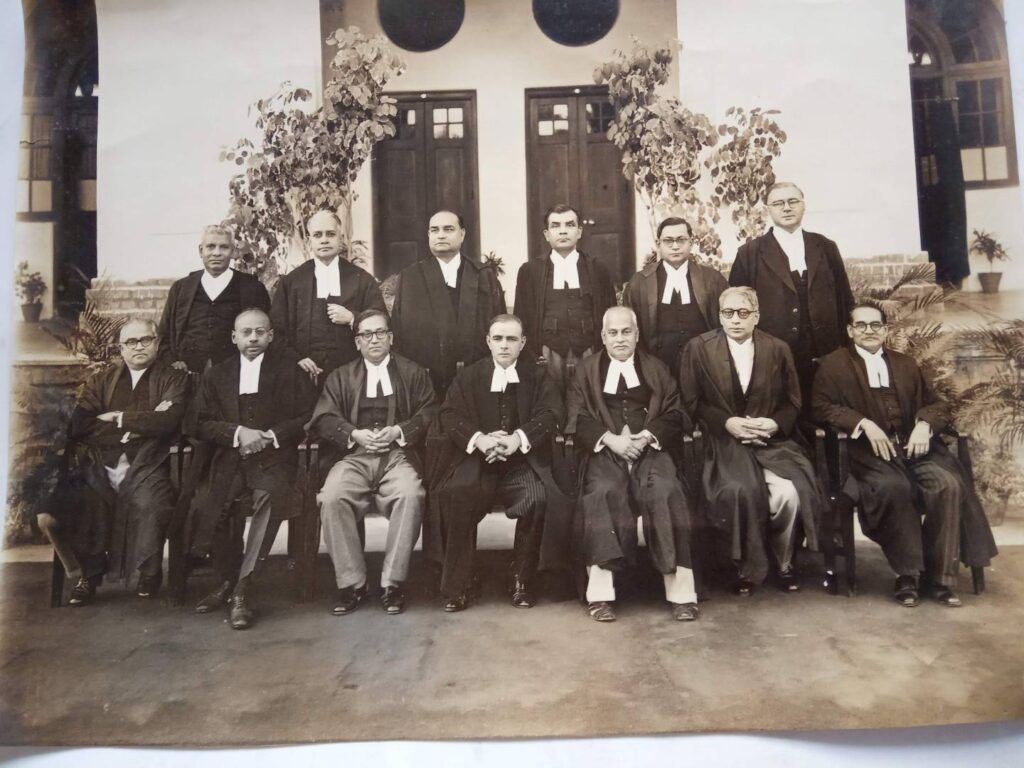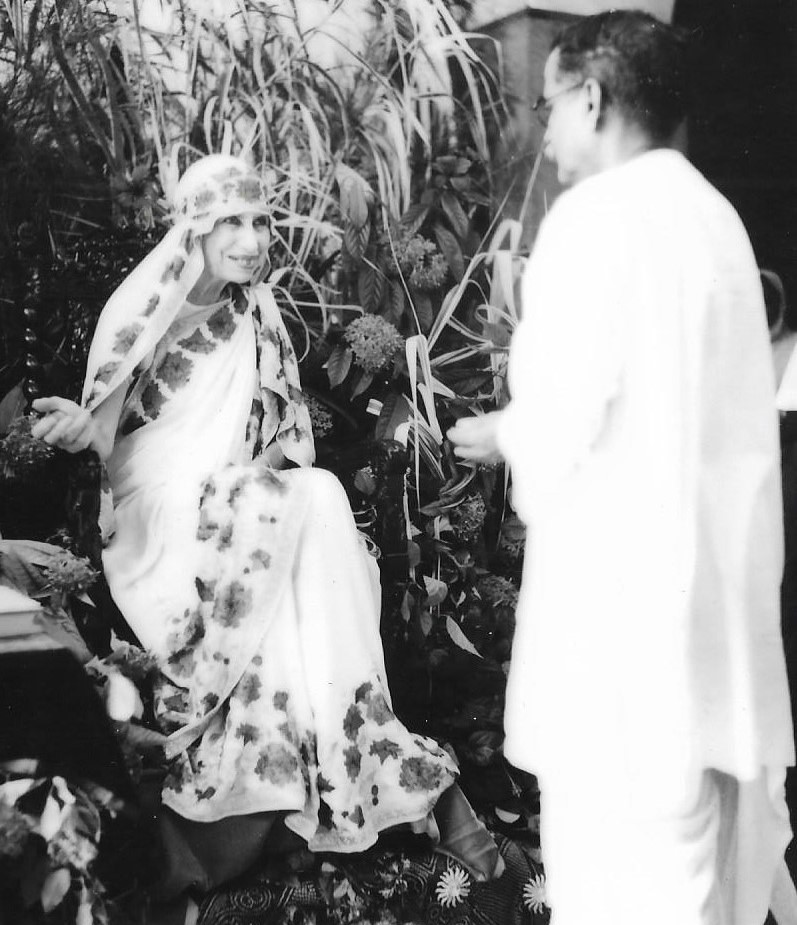
Bashisht Babu — we called him so — was born in a middle class family at a village called Suhwal in Gajipur District of Uttar Pradesh. About his childhood we do not know much. But what he spoke to us about that period, it can safely be inferred that it was a period of uncertainty and chequered early education. But he had an iron determination and in spite of odds he managed to carry himself through difficulties and was able to do Bachelor of Arts and finish his Bachelor training in Law. He stayed during this period with Raghavendra Narayan Singh of Benares — at present called Varanasi — who happened to be related to him.
After completing his Bachelor’s training in Law he joined the Bar at Patna High Court. It may be recalled here that his village was situated in the area of Uttar Pradesh separated from Bihar by the holy river Ganga. Starting his Law practice at Patna came convenient to him as there were friends available to him here who came forward to help him. As an advocate he soon established his reputation and had a flourishing practice. He gave his heart to the practice. But he was cut out for things rarer than just a successful advocate. He loved his country, he sought God. As a patriot he secretly helped the freedom struggle by providing relief to the people who had joined the struggle actively and needed monetary help. But his deeper hunger remained and he sought satisfaction of the soul. He joined the group of kindred aspirants at Patna and started his visits to Ayodhya. There he came into contact with Shri Ramakrishna Das — a sadhak from Orissa, who lived on bare subsistence relying on God visibly abandoning himself to the Divine mercy. This trait of Ramakrishna Das made a ready appeal to him and soon an intimate spiritual friendship was struck between the two.
Friendship between the two deepened with the passage of time. Ramakrishna Das who hailed from Orissa was doing sadhana at Ayodhya was ardently following his line of approach to spiritual fulfillment under the guidance of a saint of Ayodhya called Mauni Baba. Now Mauni Baba was no more. Now he too was searching for a guide who could satisfy his urge for a more ample fulfillment. It was at such a significant moment that one Mr. Tripathy gave him a booklet concerning Sri Aurobindo’s Yoga. Ramakrishna Das-ji was fired at the discovery of a way of Yoga which not only tried to realise the Divine but also to manifest and establish the Divine in earthly life. Nobody had spoken of the earthly life turning into a divine life though we have been hearing from the time of the ancient awakening — yadiha tadamutra — what is here it is there also. We have been parroting the ancient formula of wisdom, sarvam khalu idam brahma, and yet we in our practical life have been failing to apply to our external frame or procedure of life. We have been left free for the play of the darker forces.
Naturally this came as a new discovery to Shri Ramakrishna Das and he very ardently started exploring the way to push to Sri Aurobindo Ashram which was located in the far south at Pondicherry. It was decided that Ramakrishna Das-ji would go to Pondicherry first and inform Bashisht Babu of his impression which was the basis to form his decision to follow. Ramakrishna Das-ji came to the Ashram at Pondicherry in February 1945 and having received an encouraging response from his Bashisht Babu also came in a few months after in August. Ramakrishna Das-ji had settled at the Ashram and Bashisht Babu too made up his mind. Even after the two friends had made their choice, they stuck to it and their friendship went on deepening as two fellow children of one Divine Mother.
I had heard earlier about Bashisht Babu as a devotee of Sri Aurobindo from Patna. But I had not seen him. It was for the first time in February 1949 that we two met here at the Ashram on the occasion of Darshan on the Divine Mother’s Birthday. Bashisht Babu was weak and carried a rubber seat for himself for he found it difficult to squat comfortably on the ground. He was extremely loving and simple. Though he was senior to me in age by more than twenty years, he was full of affection and warmth so much so that Mona — the lady In-charge of Golconde — took us for full brothers mistaking Narain which was a part of the names of both of us as our common surname and belonging to the same family. I had to clear her confusion one day much later. Bashisht Babu had a very deep devotion for the Mother and regarded the Ashram with high reverence. He was enthusiastic and helpful to anyone who wanted to read the books of the Mother and Sri Aurobindo and come to the Ashram at Pondicherry.
Bashisht Babu was soon appointed a Judge in the High Court of Patna. This raised his position. But I think, it lowered his income considerably. He had to discipline himself. He had no difficulty. For even earlier, when he earned a lot more, his life style was of bare simplicity and he could manage himself very well. But his responsibilities had many facets. And it was on the strength of his very simple habits that he could contain them and push through triumphantly.

I have earlier said that his appointment as a judge at Patna High Court was not helpful to him financially. He now did not have the same convenience in helping individuals and institutions. But there was one thing that put him into a great quandary. He surrendered himself at the Lotus Feet of the Mother and received as a child a convenient amount to run his household. When he retired he was called upon to take up the Vice-Chancellorship of Patna University. It was another appointment which he accepted gladly. It was again for the fact that he did not like to deprive himself of some monetary offering. Moreover Bashisht Babu was a little more enthusiastic about the prospect before him of introducing for the study at the various levels at the university some of the inspiring texts which could build up a wholesome atmosphere at the centre of education. I was then a member of Syndicate of the Patna University and warned him of the unreceptive atmosphere. Soon the university affected unfavourably for him because of the change in the Government of the State. And Bashisht Babu had to face a rough time. It was an experience which can only be understood with reference to the path of Yoga which was the path adopted by his soul in this life, which was the path arduous, dangerous and difficult. I was told that the Divine Mother did not like his going out for the appointment as a Vice-Chancellor but it was his enthusiasm for serving the Mother financially that pushed him towards it.

The Mother with Bashisht Narayan Rai
Bashisht Babu’s family was already settled in Sri Aurobindo Ashram, Pondicherry, and his children including his grand-children were getting educated at the Ashram Education Centre. Bashisht Babu had a rich sense of humour which helped him a lot in taking him through the turbulent days at the University when he had to hear bitter criticism of his own policy and attitude.
Bashisht Babu’s devotion and faith was of rare quality. He was fearless and composed in extremely dangerous situation. Once while staying at Pondicherry he had what they call intestinal obstruction. He was advised immediate operation which could only be possible at Madras. A car was soon brought at the door, but I found him writing instructions regarding what could be done if he did not survive the operation. He signed various cheques and gave instructions as though he was going on a pilgrimage. Fortunately he returned smiling as operation was not needed.
Bashisht Babu had suffered cancer and was already operated upon earlier. While still at Patna, the disease reappeared and he was advised operation again. It was the summer season of 1963. I was making ready for my journey to Pondicherry, which I usually did with him. I went to see him at the Patna Medical College Hospital. He greeted me with a smiling face, cutting jokes as ever. I told him of my intended journey. Then seeing him in such a normal, rather jovial mood, I told him that in my next journey to Pondicherry, I will not miss him. He smiled again and laughing out told me that it could be very much so if he did not make an earlier journey to Bansghat — where they usually cremate the dead bodies at Patna. It was perhaps the last sentence of a dark significance I heard from him.
For still when I remember this I feel like standing in the daylight with a thick cloud overhead. Was it just a prevision or death itself pouring out his determination? But the smile of his lips! Surely the son of Immortality was there behind. For Bashisht Babu had taken up Sadhana in dead earnest. He had some rare visions and experiences of which he would talk to me in inspired moments. He had got painted a vision of the soul he had. He was prone to quoting significant utterances from Tulsidas that reminded one of the depth of his commitment to the Divine. His eyes were usually wet when he remembered the Mother and Sri Aurobindo. His exterior was deceptively simple. At the Ashram he usually wiped utensils. It was a work which did not require any visible skill. But one could not miss the skill if one had the inner perception. It was like an integral action of the being. It was like the very delight of existence that took up the work upon itself and did the yoga of the Gita — YOGAH KARMASU KAUSALAM — the skill in action flowing out of the gathered application of the entire being.
Sjt. Rai was a lesson to many of us. His simplicity and devotion bring to us the fragrance of India’s Soul. It is India’s inner being that peeps out through such windows and fortifies our faith in the upward path.
Was fortunate enough to come into contact with his grandson and relatives of the family in my childhood, but had never heard Chhotenarayanji speak to me about him except once, regarding work given to him by the Mother on one occasion when he was incapacitated by severe back pain, during one of his visits, to sweep the ashram courtyard, his mind could not accept the idea how can he in his condition do the work given by the Divine Mother, but overcoming his mental doubt he tried to get to work with great hesitation and misgivings, and had a tremendous experience( I forgot) and his back was completely cured over a few days. Great man who brought his whole family and friends to the Mother’s path.
The following excerpts are from the Mother’s Agenda (6 July 1963) where she speaks of Bashisht Narayan Rai:
‘The other day, I told you, I think, that one of my present activities consisted of a sort of conscious concentration on one person or another, one thing or another, to obtain the desired result. For years on end, the Will and Force acted from above, and the outer conscious being [of Mother] wasn’t concerned with anything further, knowing that it would only make things more complicated instead of helping them, and that the Force left to itself, directly under the supreme Impulsion, worked things out far better and far more accurately. But over these last months, there have come a will and a tendency to make the material being [of Mother] participate consciously in the details of execution. It has a kind of passive obedience, and so, once that was willed [the need for Mother’s material intervention], it began to happen. There was a case recently, with a very good friend of the Ashram, a man with an important position who has been very, very useful. He had to be operated on (I won’t tell the whole story, it would be too long); we received two or three wires a day, I followed the thing step by step. There was a very powerful force of destruction—it was a very grim battle—and there was a will to keep him, because in this body he had been very useful, he was still very useful and could still be very useful. He had a great faith, a great trust, and he was conscious (his consciousness was very sufficiently developed: I saw him constantly and constantly he came to me). He fell into a butcher’s hands; anyway, it was a wretched thing. Still, even though everyone expected him to leave his body, he held on and was constantly saying (we were kept informed by his son) and feeling that it was I who was keeping him alive. I could even see what they should have done and constantly I sent the formation, the thought, “But THIS is what should be done,” insistently. Finally they caught my thought, but I think (I can’t say, I don’t know the details, the small material details), I think probably they didn’t do exactly what they should have—that’s why I say they must have been butchers. Thus they performed three operations in a row, and after undergoing all that, he came to me (before also he used to come very often—they said he was drowsy all the time, in a semi-coma, but that’s not it: he was living inwardly), he came to me, totally conscious as usual, but he said, “I am afraid my body is irretrievably ruined, and if I survive now, instead of this body being a help and a tool of work, it will be a hindrance, an impediment, a source of difficulty, so I have come to ask to be freed—I prefer to enter a new body.” I answered immediately, “But as you are, you are useful, very useful; the position you occupy makes you very useful; you are totally conscious; it would be good if you could recover.” He listened, again insisted a little, I too insisted, and then he left.
‘The next morning, he was much better. I was hoping he had decided to stay, but we were without news for about twenty-four hours, till suddenly we were told he had stopped breathing and was being given oxygen. And then he left.
‘And I saw it so clearly: had he consented… (naturally, every being’s soul is free, it is free to decide), had he consented to stay on, I would have had enough power to keep him, to maintain his body in a condition good enough to keep him alive, BUT I DIDN’T HAVE THE POWER TO UNDO THE DAMAGE DONE—that isn’t there yet.
‘That showed me the exact extent. That isn’t there yet. The transformation isn’t there yet.
I mean it’s not something I have at my COMMAND and can pass on to someone. Many other powers are at my command and can be passed on to one or another, but this…
‘Now I’ll try (I always say “try” because… there are always ill-intentioned ears listening in!), anyway, the next step is to give him a new dwelling. This belongs to the domain of things that are not only feasible but done all the time.
‘He was very conscious, with a lovely faith. He was an active man, very energetic (a short man). How active! And very energetic, with great authority, oh!… The idea of being dependent on people who would have to nurse him… he preferred to leave. He was conscious enough to know that the essence of his being, of his experience, is not lost—but still there is all that materially one has built painstakingly, and especially in his case, his position is the result of a whole life. I don’t know….
‘Begin again in a little baby?… (Mother shakes her head negatively) There’s the rub, you see. When Sri Aurobindo left, he said, “I will return in a being formed supramentally—entirely conscious, with full capacities.”’ (pp. 213-215)
Very grateful from the deepest of my heart. Koti kiti naman.